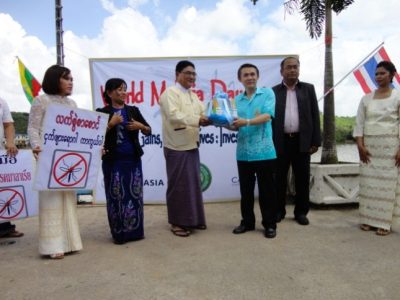In March and August of 2012, PMI provided support for working group meetings to identify local needs, challenges, and opportunities at selected cross-border sites and to develop implementable action plans.

Representatives from the twin-cities of Pailin and Chantaburi met at the Cambodia-Thailand border crossing for a joint celebration of World Malaria Day in 2012. Source: CAP-Malaria/URC
Effective collaboration on cross-border issues requires political and financial commitment at many levels within health ministries of participating countries. In addition, given the dynamic nature of malaria transmission in border areas, it is necessary to build the capacity of local health authorities and decentralize responsibilities to them so that they can engage with their counterparts in neighboring countries and implement coordinated malaria control efforts. PMI is supporting these cross-border collaboration efforts between Burma, Cambodia, and Thailand. In March and August of 2012, PMI provided support for working group meetings to identify local needs, challenges, and opportunities at selected cross-border sites and to develop implementable action plans. In order to promote local ownership of cross-border coordination, participants were drawn from national programs, health administrations at the province, town, and district levels, NGOs, and other agencies from all three countries.
Outcomes from the meetings included: (1) the adoption of a twin-cities model for cross-border health collaboration between Burma, Cambodia, and Thailand; (2) the selection of two twin-cities sites, namely Kawthaung–Ranong on the Burma–Thailand border, and Pailin–Chantaburi/Trat on the Cambodia–Thailand border; (3) a commitment to building cross-border relations through quarterly meetings between twin-cities counterparts and exchange visits; (4) sharing of relevant malaria information (e.g. reports of monthly confirmed malaria cases and transmission foci, and vector surveillance information); (5) joint twin-cities activities (e.g. World Malaria Day celebrations); and (6) exchanges and/or co-development of information education/behavior change communication materials to target specific populations at each pair of twin-cities.
In the coming year, this PMI-supported project will support the establishment of communication channels for routine reporting of malaria control information so that information can be integrated into the regional network of disease surveillance. To encourage synergy between malaria control efforts on both sides of the border, the project will also provide assistance for the development of coordinated workplans. These twin-city partnerships can serve as model for cross-border cooperation to combat drug-resistant malaria in in the Greater Mekong Subregion.
